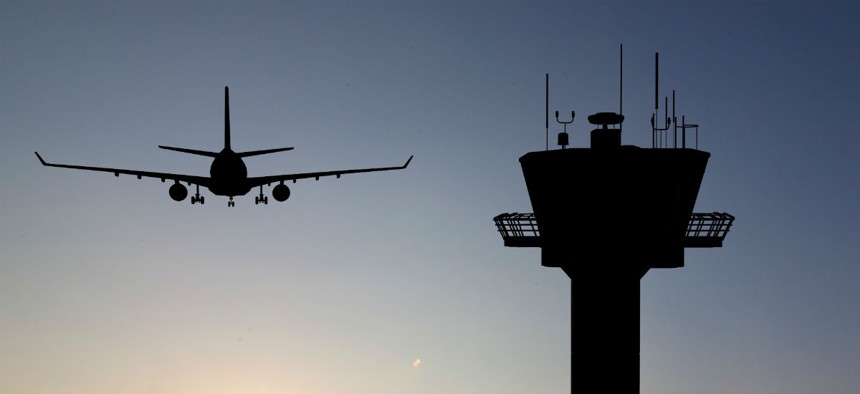House Slated to Debate Air Traffic Control Privatization As Deadline Looms
Congress must reauthorize FAA by end of September, and the Senate may not be on board with wholesale changes.
House lawmakers are preparing in the coming days to debate a proposal that would spin off the nation’s air traffic controllers to a nonprofit entity, but its fate is uncertain in light of a tight deadline to reauthorize the Federal Aviation Administration and resistance in the Senate.
President Trump and House Transportation Committee Chairman Bill Shuster, R-Pa., introduced a proposal earlier this year to privatize the FAA’s air traffic control operations as part of the agency’s annual reauthorization.
The 21st Century Aviation Innovation, Reform and Reauthorization Act (H.R. 2997), which was approved by the House Transportation Committee in June, would shift the nation’s 30,000 air traffic control employees into a new nonprofit entity that would be governed by a board made up of representatives from airlines, employee unions and general aviation and airport trade groups.
Proponents of the legislation have argued that privatization is necessary because the FAA has struggled to implement technological upgrades like NextGen, an effort to implement GPS tracking of airplanes across the country instead of the antiquated and less precise radar system.
While House leaders had planned to hold a vote on the bill this week, complications as a result of hurricanes Harvey and Irma could push the debate back until next week, AINonline reported. Congress has until Sept. 30 to send an FAA reauthorization bill to Trump’s desk.
The delay shortens an already tight window to advance a must-pass bill, and the Senate may not be willing to go along with ATC privatization. The Senate in July advanced its own FAA reauthorization legislation, which did not include changes to the system or its governance.
Further complicating the issue are two competing studies by government watchdog groups last week. The Transportation Department inspector general said the FAA’s benefits estimate for NextGen is “overly optimistic” and fails to take into account the potential for future delays.
“Many of the business case’s planned improvements are dependent on key infrastructure programs and related enhancements . . . that are ongoing or planned,” the inspector general wrote. “Thus, a delay in one program could cause a ripple effect in delaying other programs given the interrelated nature of airspace modernization efforts.”
The inspector general also said that more than half of the agency’s projected benefits derived from NextGen implementation come from improvements that FAA has not yet begun to implement.
But the Government Accountability Office’s analysis found that FAA has improved its implementation of NextGen and is now making progress. It noted that upgrades have been made at 39 of the 40 busiest airports in the United States, and that the agency’s most recent cost estimates for the project remain “within range” of its 2007 numbers.
GAO also found that the ATC privatization proposal could result in a number of new roadblocks for NextGen.
“The change could result in more certain funding, as funding would not be subject to the federal budget process,” the report said. “However, other challenges could develop. . . . One issue would be the amount of time and costs required to complete a transition from FAA to another ATC operator. This transition time would include the time it could take to terminate or revise current contracts between FAA and companies that produce NextGen technologies.”
Shuster touted the findings of the inspector general’s report last week.
“It’s astonishing that the FAA doesn’t know if it’s getting what it’s paying for with the taxpayers’ money,” Shuster said in a statement. “How many more examples does Congress need before we recognize that the federal government is incapable of managing a complex, high-tech, multi-year modernization program?”
Meanwhile, Rep. Peter DeFazio, D-Ore., ranking member of the House Transportation Committee, highlighted GAO’s conclusions.
“[The GAO] report confirms that light is at the end of the NextGen tunnel,” he said. “The GAO validated the fact that NextGen is within the cost range that the FAA predicted in 2007, refuting claims by FAA critics that NextGen is somehow over budget. Moreover the GAO found that the controversial proposal by congressional Republicans and the Trump administration to privatize the air traffic control system and hand it over to special interests is, itself, a major challenge to continued NextGen implementation.”








